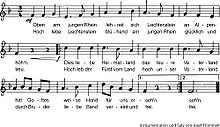Lixtenshteyn davlat madhiyasi
 | |
|
| |
| Soʻz muallif(lar)i | Jakob Josef Jauch, 1850-yillar |
|---|---|
| Bastakor | Nomaʼlum bastakor („Xudo qirolichani asrasin“ kuyidan foydalanadi) |
| Qabul qilindi | 1870-yil (rasmiy 1920; 1963 yilda tahrirlangan) |
„Oben am jungen Rhein“ (nemischa talaffuzi: ˈoːbən am ˈjʊŋən ˈʁaɪn; tarjimasi „Yosh Reyn tepaligida“) — Lixtenshteynning milliy madhiyasi. 1850-yillarda yozilgan bu asar 19-asrda nemis tilida soʻzlashuvchi xalqlarning, jumladan Prussiya, Saksoniya va Shveysariya, Bavariyaning qator madhiyalari uchun ishlatilgan „Xudo qirolni/qirolichani asrasin“ Britaniya madhiyasining ohangiga oʻrnatilgan.
Tarix
[tahrir | manbasini tahrirlash]"Oberst am jungen Rhein" dan boshlangan asl matn 1850-yillarda yozilgan. Qoʻshiq nemis „Reyn qoʻshiqlari“, yaʼni Germaniya milliy merosining bir qismi sifatida Reyn daryosini nishonlaydigan, daryoning chap qirgʻogʻidagi fransuz hududiy daʼvolariga qarshi qoʻshiqlar bilan birlashtirilgan boʻlishi mumkin.
Matn Jakob Josef Jauchga (1802-1859) tegishli.[1] Rossiyada tugʻilgan shveysariyalik katolik dinini qabul qilgan Jauch 1828-1832 yillarda Shveysariyada ilohiyotni oʻrgangan va 1833-yilda katolik ruhoniysi sifatida muqaddas dinga qabul qilingan. U 1837/8-1850 yillarda Londonda ruhoniy boʻlib xizmat qilgan. 1852-1856 yillarda u Lixtenshteynning Balzers shahrida yashadi va malika Franziska bilan doʻstlashdi va u bilan Balzersda namunaviy oʻquv muassasasini qurishni rejalashtirgan. Oʻzining progressiv pozitsiyasi tufayli Jauch cherkov ierarxiyasi bilan ziddiyatga tushdi va Chur episkopi 1856-yilda unga Lixtenshteynni tark etishni buyurdi. Agar qoʻshiq matni Yauchga tegishli boʻlsa, kompozitsiya Yauchning Balzersdagi davriga toʻgʻri keladi (1852-1856).
Qoʻshiq matnlari Jauchning hayoti davomida nashr etilmagan. Ular Lixtenshteyn milliy madhiyasi (Die Liechtensteinʼsche National-Hymne) sifatida faqat ogʻzaki uzatish davridan keyin, 1875-yilda nashr etilgan, shuning uchun Jauchning mualliflik anʼanasi yoki uning soʻzlarining asl shakli boʻlishi mumkin emas va bu tasdiqlangan.[2] Qoʻshiq Lixtenshteynning norasmiy, de-fakto milliy madhiyasi boʻlib, 1870-yillardan 1920-yilgacha rasmiy qabul qilingunga qadar xizmat qilgan.
1963-yilda matn qisqartirildi va 1920-yilgi versiyada kiritilgan „German Reyn“ga havola olib tashlandi.[3] Oben am jungen Rhein inglizlarning „Xudo qirolichani asrasin“ (1961-yilda Shveysariya Rufst du, mein Vaterland oʻrnini egallaganidan beri) bilan bir xil ohangni baham koʻrgan yagona milliy madhiyadir.[4][5]
Matn
[tahrir | manbasini tahrirlash]| Nemis tilida | Inglizcha tarjima |
|---|---|
I |
I |
Manbalar
[tahrir | manbasini tahrirlash]- ↑ „Up above the young Rhine (Oben am jungen Rhein)“. Cantorian. Qaraldi: 2015-yil 26-yanvar.
- ↑ The full seven verses were printed in „Die Lichtensteinʼs he Nationalhymne“, Süddeutsche Presse, 21 March 1875 p. 2. Reprinted from the Süddeutsche Presse report, but shortened to five verses: Das Echo, 16 May 1875, p. 78, Neue Freie Presse Wien, 23 March 1875, p. 2; mentioned as „composed in the 1850s by a Catholic pastor“ (in den Fünfziger-Jahren von einem katholischen Pfarrer gedichtet).
- ↑ „Liechtenstein“. nationalanthems.info. Qaraldi: 2015-yil 26-yanvar.
- ↑ Pound, Jeremy „Five intriguing national anthems“. ClassicalMusic.com (2016-yil 16-fevral). 2020-yil 16-aprelda asl nusxadan arxivlangan. Qaraldi: 2016-yil 15-sentyabr.
- ↑ „How many national anthems are plagiarised?“. BBC News (2015-yil 26-avgust). Qaraldi: 2016-yil 15-sentyabr.
Havolalar
[tahrir | manbasini tahrirlash]- Liechtenstein at a glance – The National Anthem – The Portal of the Principality of Liechtenstein has a page in English about the National Anthem, while the German version of the page has an MP3 instrumental file of the anthem
- Streaming audio, lyrics and information for the Liechtenstein national anthem (archive link)
- Himnuszok – A vocal version of the Anthem, featured in "Himnuszok" website
